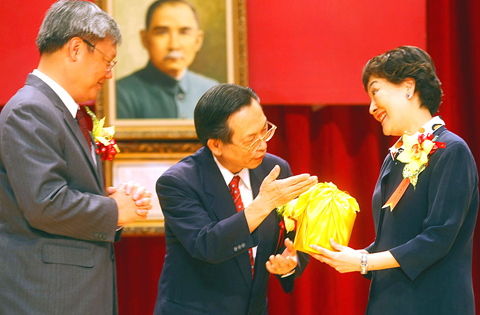Commissioners from the National Communications Commission (NCC) yesterday chose Bonnie Peng (彭芸), a journalism professor at National Chengchi University, as the new NCC chairwoman.
Commissioner Chen Cheng-tsan (陳正倉) was selected as the commission’s vice chairman. Chen is currently an economics professor at National Taiwan University.
The fact that Peng was elected was no surprise to many, as she was the only commissioner who clearly indicated that she “was willing to consider the possibility” of becoming chairperson during a review session at the Legislative Yuan last month.

PHOTO: CNA
Peng’s predecessor, Su Yeong-ching (蘇永欽), handed her the official seal during an inauguration ceremony yesterday morning.
While a ruling from the Council of Grand Justices in 2006 said that Su and the other eight commissioners could stay in their positions until December this year, the NCC members decided to step down early in January. However, their resignation was postponed as the Executive Yuan had trouble finding replacements.
Su said in a speech yesterday that the appointment of the new NCC commissioners came at a perfect time.
He said that he believed that the commission could run independently and would “try not to be too cozy” with the Executive Yuan.
Peng, on the other hand, said what she could bring to the commission was the aspiration to “dream big.”
“While we are seeking advancement in communication technology, we also need to pay attention to issues concerning cultural diversity and take care of the economically disadvantaged,” she said.
In addition to Peng and Chen, the other five commissioners — Hsieh Chin-nan (謝進男), Liu Chorng-jian (劉崇堅), Weng Hsiao-ling (翁曉玲), Lee Ta-sung (李大嵩) and Chung Chi-hui (鍾起惠) — met with reporters for the first time and talked about what and how they could contribute to the operations of the NCC.
Weng, an expert in technology law and the legal specialist on the team, said she aims to address similarities and differences among different communications laws and try to impose one consistent regulation on all telecom service operators.
Lee said he would address issues concerning more efficient use of the nation’s radio spectrum and new communications platforms.
Chung, on the other hand, said she would aim to reinforce the self-discipline of the media.

The manufacture of the remaining 28 M1A2T Abrams tanks Taiwan purchased from the US has recently been completed, and they are expected to be delivered within the next one to two months, a source said yesterday. The Ministry of National Defense is arranging cargo ships to transport the tanks to Taiwan as soon as possible, said the source, who is familiar with the matter. The estimated arrival time ranges from late this month to early next month, the source said. The 28 Abrams tanks make up the third and final batch of a total of 108 tanks, valued at about NT$40.5 billion

Travel agencies in Taiwan are working to secure alternative flights for travelers bound for New Zealand for the Lunar New Year holiday, as Air New Zealand workers are set to strike next week. The airline said that it has confirmed that the planned industrial action by its international wide-body cabin crew would go ahead on Thursday and Friday next week. While the Auckland-based carrier pledged to take reasonable measures to mitigate the impact of the workers’ strike, an Air New Zealand flight arriving at Taipei from Auckland on Thursday and another flight departing from Taipei for Auckland on Saturday would have to

A group from the Taiwanese Designers in Australia association yesterday represented Taiwan at the Midsumma Pride March in Melbourne. The march, held in the St. Kilda suburb, is the city’s largest LGBTQIA+ parade and the flagship event of the annual Midsumma Festival. It attracted more than 45,000 spectators who supported the 400 groups and 10,000 marchers that participated this year, the association said. Taiwanese Designers said they organized a team to march for Taiwan this year, joining politicians, government agencies, professionals and community organizations in showing support for LGBTQIA+ people and diverse communities. As the first country in Asia to legalize same-sex

MOTIVES QUESTIONED The PLA considers Xi’s policies toward Taiwan to be driven by personal considerations rather than military assessment, the Epoch Times reports Chinese President Xi Jinping’s (習近平) latest purge of the Chinese People’s Liberation Army (PLA) leadership might have been prompted by the military’s opposition to plans of invading Taiwan, the Epoch Times said. The Chinese military opposes waging war against Taiwan by a large consensus, putting it at odds with Xi’s vision, the Falun Gong-affiliated daily said in a report on Thursday, citing anonymous sources with insight into the PLA’s inner workings. The opposition is not the opinion of a few generals, but a widely shared view among the PLA cadre, the Epoch Times cited them as saying. “Chinese forces know full well that